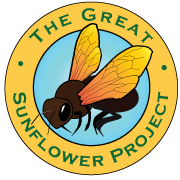
Dear All,
I hope you had a wonderful 4th of July! Here at the Great Sunflower Project, we've been busy counting bees and thinking a lot about pesticides. Thank you again to the many of you have planted Lemon Queen sunflowers this year to contribute data to our Safe Gardens for Pollinators Program. Please do try to get at least three counts done before fall. Having multiple samples at one garden ensures that we get an average for that garden rather than the worst or best day! And, remember, the most important data are those zeroes. When you don't see any pollinators, we want to figure out why!
We have an amazing and important opportunity to gather data on pesticide effects on honeybees. A research group at Southern Illinois University has offered to test bees from your gardens for pesticides. This will let you and us know how much pesticide is being used in the environment surrounding your backyards, gardens and parks. Our plan is to tie the pesticide levels to pollinator counts! If you would like to have bees from your site tested, you need to catch 20-40 bees using a net or jar or any other "dry" collection methods. If the bees are caught in alcohol or water, they can't be tested. Once you have caught a bee, you can stick it in the freezer in a zip-lock bag. Now, taking 20-40 bees sounds like a lot but most honeybee hives house upwards of 30,000 bees in the summer time and you probably are catching bees from several different hives. Anyone who has submitted a bee count to the Great Sunflower Project can participate in this and we are especially interested in folks near agriculture as that's where most of these pesticides are used. You do not have to catch all the bees on the same day, just keep them in the freezer until you have enough. When you are ready, please mail them to the following address with a note inside giving your Great Sunflower Project name and the Great Sunflower Garden name and address of the garden where you collected the bees and a way to contact you if we need to clarify anything..
Dr. Da Chen
1125 Lincoln Drive
Life Science II, Room 251
Southern Illinois University
Carbondale, IL 62901
It is very expensive (over $1,000 per site) to run these analyses so, please do consider participating. We may not be able to get these data again.
On a brighter note, Kate Frey, the designer of the fabulous Melissa Garden and I are working on a gardening book. While we know many of the pollinator gardens in California, we don't know what exists across the country. So, I'm asking for your help identifying gardens that we might want to include. In addition, if you have high quality photographs of wonderful gardens that support bees, we would love to see them to consider including in the book! We want to profile beautiful gardens across the United States and Canada!
Bee Well!
Gretchen
